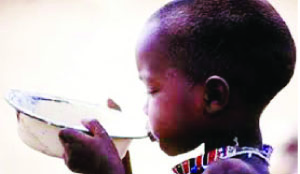
• Statistics indicate that Zambia records one of the highest rates of malnourished children in the world.
By SARAH TEMBO –
MALNUTRITION has been a long-standing problem and is one of the leading causes of death among children in Zambia.
This ailment affects many children under the age of five and has serious health implications to survivors of the scourge.
Statistics indicate that this country records one of the highest rates of malnutrition in the world and that about half of local children are stunted, while one in five is underweight.
It is also evident according to medical results that survivors of chronic malnutrition do not always return to their full strength after any nutritional interventions.
While prolonged or frequent malnutrition can cause permanent damage to growing bodies, they stop walking, and their brain development is affected.
In this context, the impact of malnutrition on the national human capital base is sufficiently large to pose a serious threat to prospects for effective economic development.
Malnutrition affects access to school, capacity to learn, physical development, and energy to work, as well as ensuring that productive years are lost in additional morbidity and mortality terms.
The main cause of malnutrition is poverty and the situation is much worse for most rural inhabitants because the Micronutrient (vitamins and minerals) status is generally poor throughout a typical year since the daily diet is monotonous.
A particular diet consists of one or two staple crops and little else and the nutritional status deteriorates during the pre-harvest season, when the supply of food is most limited and transmission of disease is highest due to heavy rains.
Children under five, those of school-going age and women of reproductive age are most vulnerable to malnutrition because their requirements for energy, micronutrients and protein are high during these periods of rapid growth.
Mumbwa District is one of the districts with the highest number of under-five children affected by malnutrition.
In this respect, Concern Worldwide has come up with a project called Realigning Agriculture to Improve Nutrition (RAIN) aimed at supplementing Government efforts by educating farmers on how they can plant different types of crops that are rich in nutrition throughout the year.
Concern Worldwide started operations in 2001/2002 when there was drought and since then, the organisation has been implementing programmes in Western Province and Mumbwa District.
RAIN project integrates agriculture and nutrition in order to improve nutritional status within the critical 1000 days from conception until a child reaches its second birthday.
It is also aimed at developing a sustainable and replicable model that can be scaled, supported by a strong and comprehensive monitoring and evaluation component.
Concern Worldwide communication and documentation officer Reginald Ntomba says since the project started in 2011, 4500 households have so far benefited.
He says the project was designed to educate the rural communities on how they can address the problem of malnutrition before a child actually became malnourished.
Under this project, farmers are given different type of seed and trained on how to grow them and explaining to them the type of nutrition found in that particular food.
The farmers have been given seed beans bought from Zimbabwe which are rich in iron.
Mr Ntomba explains that this type of beans has an important nutritional value for pregnant women as it prevents anaemia and good for under five children.
Farmers are trained on how they can plant different types of crop and how they can combine those foods to prepare a balanced diet.
“The project that started in 2011 and ending in 2015 has benefitted 4500 households and so far according to the reports we are getting, malnutrition has reduced by more than 20 per cent,” Mr Ntomba says.
Mumbwa District Commissioner Sunday Shamabanse says the number of children suffering from malnutrition in Mumbwa has drastically reduced following the implementation of the RAIN project by Concern Worldwide.
He says the project has benefited a lot of families; children and pregnant mothers have become more healthy because they were able to eat different types of food just from their farm produce.
Mr Shamabanse explained that before the implementation of the RAIN project Mumbwa was one of the districts with the highest number of children suffering from malnutrition.
The district had the population of 1,268 under five children and before the RAIN project 45 per cent were malnourished but after the project only about 20 per cent were malnourished.
“My district is one of the districts with the highest number of children suffering from malnutrition but with this project that has started yielding positive results we have hope that malnutrition will be completely eradicated.
“We want to reduce the prevalence of chronic malnutrition among young children and improve the nutritional status of pregnant and lactating women in Mumbwa District through targeted intervention during the first 1000 days,” he said.
Mirriam Muluri one of the beneficiaries of the project said before the project was implemented, her children suffered from malnutrition but after being taught how to plant different types of crops in her garden, there had been greater improvement.
“I have planted 17 different types of crops in my garden and I am able to feed my children with a balanced diet just from my farm produce,” she says.
Nyanselo Sitali says the project has significantly improved the status quo because of the education the farmers have continued to receive.
He said it was important for organisations to partner with Government in uplifting the living standards of the people.
RAIN has taught a large number of Mumbwa residents on how to preserve seeds and ensure that they never run out of the farming input.






